- Home
- M G Vassanji
Uhuru Street Page 3
Uhuru Street Read online
Page 3
Much as I liked Ali, and despite our special relationship, it was I who proved my elders right and caused Ali to leave us. There was something else for him in our home.
Every afternoon, at about three o’clock, Ali would leave the store and go upstairs to the flat to make tea and bring it down in a thermos. Mother was practically addicted to tea, which she required in regular doses. Without it her headache would creep up on her, paralysing her and causing the rest of us much anxiety. But Ali never had to be told – the tea was there when she needed it. It was one more reason that made him so special.
One afternoon Mother ordered me to go up after Ali to remind him to make an extra cup for my aunt who would be visiting. Grumbling, I went upstairs as I’d been told. When I reached the landing the door was open. This was normal, of course – Mehroon was inside, and a girl did not lock herself up with a man, let alone a servant. But as I walked in, a strange and at first comical sight met my eyes, the meaning of which took me a while to realise.
Ali stood perched somewhat precariously on the large wooden dining table which he had moved. He was leaning against the top of the bathroom door and, face pressed against the metal bars, was looking down through the ventilator window above it at my sister Mehroon taking her afternoon bath. Upon hearing me, he started, looked at me, and jumped lightly down on the floor.
‘I shall marry her,’ he said, as if confidingly, and moved the heavy table back.
Ali was dismissed immediately, and Mother went without her tea that day. I never saw him again. Perhaps he went back to his farm, but more likely he found better employment elsewhere, possibly even with a European family. He was followed by Elias, more sombre, solid, who was not as good, but who stayed longer.
Alzira
The Jiwanis moved away to better times and places, all ten of them, and the four Pereras moved into the flat across the street. They brought to the place an air of gloom and depression such as it had not seen before. Soon afterwards Mrs Daya their neighbour reported to Mother: ‘They come with a secret to hide.’
Each morning Mrs Daya descended on the street from the second floor, and did her rounds of the stores, while waiting for the fruit and vegetable sellers to arrive. She brought the freshest news and gossip. But the Pereras were Goans and their affairs of little interest to the rest of us. They would have passed through the neighbourhood without much notice, but for Alzira.
She walked into the store late one afternoon – school over and the family noisily crowding the customer space – holding a piece of printed material with a gleaming, threaded needle sticking out from it. With the other hand she moved aside a clutch of belts hanging from the doorway. A tall ambling girl with a large mouth and short, straight hair, her long faded dress hanging loosely on her. She was grinning, a little shyly.
‘How are you, Mama?’ she said. ‘I live across the street, over there, and I sew ladies’ clothes. I charge ten shillings for a dress, but for the first one I will charge seven. When you have something, let me know.’
Mother looked at her from behind the counter and the rest of us continued to stare at her.
‘I do all the modern styles,’ Alzira told her, with a glance at my sisters. ‘Look …’
She had two pattern books under the material and Mother’s interest was caught. She took the books and flipped a few pages expertly until her eyes fell on a design.
‘Look,’ she said to my sisters, ‘the pina. Just like the one that European girl was wearing.’ Any European woman who chanced by on our street was the subject of Mother’s deepest scrutiny, as she watched out for new patterns.
Mehroon and Razia jumped up from their seats and went to look over Mother’s shoulders, while Alzira looked around the store. She checked the babies’ bonnets hanging in a bunch, made by my grandmother, then the knickers, and the dresses on the rack.
‘How would it look,’ Mother asked, her finger on the pattern, ‘if this line of buttons was removed, and instead you put a bow here – a chocolate-coloured bow?’
‘Not bad, Mama. I’ve used a lace before, but a bow would look as good. Yes!’
With this piece of tact she won a place to sit. Aloo and I were asked to disappear – to play outside or study upstairs – and Alzira sat down on the vacated bench, throwing a sly grin of sympathy at us as we went out.
It became her regular place, this bench, in the late afternoons. Sitting, legs crossed and hunched over some material, needling away, chatting with Mother, or gossiping with Mehroon and Razia when they were back from school. Alzira’s afternoon news – unlike Mrs Daya’s morning bulletin – merely supplied merriment.
We learnt that Baby, who lived in the low tin-roofed house across the street, had been ordered by her husband to touch her toes one hundred times before dinner. Poor Baby couldn’t even see her toes standing up. Alzira had simply listened in to the passionate quarrel taking place downstairs from her window. Next we received confirmation of what had long been suspected. That Roshan Mattress, who owned the third store from ours, entertained a Punjabi police inspector as lover. He came around ten o’clock in the morning pretending to look for stolen goods. The two would disappear into the shadowy interior of the store, ostensibly searching piles of mattresses and diligently prodding stacks of stuffing as they inched their way behind them. They emerged noticeably chipper, ordering tea and snacks. The inspector would leave brushing lint from his uniform and swinging his baton.
Alzira cheered us up. Her company was a boon to Mother, and she made the girls blush and giggle. Only as the afternoon drew to a close, after a cup of tea from the thermos that stood by Mother’s feet, or having been treated to bhajias from Khatibai’s Saidi who came around on a bicycle, would she gather up her things and take her leave.
What we learnt of her own family we also found out through gossip and observation. Her father was a retired civil servant, a big morose man, flushed and balding, whom we usually saw in khaki shorts and hanging shirt tails. Except on Sundays he rarely ventured out for long, going only for a paper or, it was rumoured, a bottle. The mother was a thin sickly creature, prematurely old and with dark uneven teeth, who came out on even rarer occasions. Alzira had a brother and sister, both younger and educated. Pius worked in customs at the harbour, and Maria – small, dark, vivacious – was a secretary with a law firm. They were regulars at the Goan Institute, these two, where jazz trumpets blared on Saturday nights and boys with Elvis hairstyles and girls in cancans did the rock ‘n’ roll. On Sundays Alzira walked to church with her mother and father, curbing her naturally long strides to allow them to keep pace. Maria usually got a ride, and Pius went off with some friend on his scooter.
I dreaded being sent to Alzira on errands. Her mother invariably answered the door, her black teeth and bad mood giving her the look of a snarling witch. Motioning me to wait she would go back in, while I stood outside in the littered landing for her daughter to come and see to me.
A long and dark passageway led inside, into whose mysteries I could not see and was not let in to see. But I discovered my own access: our second-storey window looked down into their three rooms facing the street. And sometimes, with nothing else to occupy me I would be drawn to that window. I looked on, unashamedly, observing the uneventful workings of that other home; long minutes of staring deep into that gloom, temple pressed against the cool metal bars. Scene after scene of silent, meaningless activity, as if carried out by phantoms. Lights on in one room; a newspaper fetched, a dress material picked up from a chair; lights off, then on in the next room; someone reading, someone sewing, someone drinking long from a glass. Rarely more than a person in a room, rarely a scene of hilarity or mirth. Sometimes the lights never turned on, and the grey evening shadows were engulfed by the black night without a protest.
The news of Maria’s engagement passed like a ripple through the neighbourhood. For the brief period of a few days it went around, was marvelled at and commented upon and then allowed to pass, pending developments. Maria was not liked v
ery much for her high and mighty (it was thought) ways and the news while it lasted was a cause for envious backbiting.
We learnt from Alzira that Maria had gone to visit an aunt in Kericho in Kenya, where she met the man she got engaged to; and (from Mrs Daya) that the aunt had made several prior phone calls and the engagement had all the appearance of being ‘arranged.’ Mrs Daya had the only telephone in their building. Maria’s fiancé (or ‘lover’ as he came to be called) was the only son of a rich family, and it was this that was the cause of all the excitement and envy. He lived with his mother and sister on a European tea estate that he managed. What he offered was nothing less than a release for Maria – a release from drab surroundings into the high and good life of garden parties, travels abroad and chauffeur-driven trips to Nairobi.
While the news was still fresh Maria herself arrived – the triumphant queen returned – not too unwilling to show herself more now while she waited and shopped for the big day. An announcement duly appeared in the Sunday Standard, accompanied by a picture of the couple. Maria had all the luck it seemed.
It was then that Mother came out with her advice to Alzira and told her not to take things too lightly.
‘You should also get married,’ she pronounced one afternoon.
Alzira deftly snapped the sewing thread from the material on her lap and smiled, retying the loose end.
‘I’m in no hurry Mama …’ she said, ‘I will bide my time. I don’t want to marry any old person and regret it for the rest of my days!’
‘Don’t be too choosy. It will be too late then. There is nothing like having a man of your own, I tell you. Even if he be one-eyed or lame – a man is a man.’ She nodded knowingly. ‘Without a man you’ll be nothing. Haven’t you had any good offers?’
Alzira grinned in embarrassment, finally looking up from her sewing. All eyes were on her.
‘There must have been some,’ said Razia. ‘Tell us about them … Come on, tell us! Please!’
Razia and Mehroon had reached fifteen and sixteen, and marriage and boyfriends had become subjects of keen interest. Only recently a young man had started spending time at our store, treating everyone to Coke and roasted mhogo and being a lot of fun – until Mother found out that he’d been boasting about his exploits with Mehroon that he had obviously made up. He was told, with much loss of face on his part, that her daughters were not ready for marriage yet and he never showed up again.
‘Well, there was this teacher …’ Alzira began.
‘Who?’ said several voices at once. All the teachers in town were known.
‘John Fernandes …’
‘Fahndo? What are you saying! Really? Mr Fernandes?’
Mr Fernandes, or ‘Fahndo’, taught history at the boys’ school and had a reputation for his arrogance. He rode a scooter, spoke good English, and was turned out rather smartly. He also knew his subject which was not always true of our teachers, especially those who came from India and Pakistan. The thought of Alzira saddled behind Fahndo, holding him by the waist, was on several minds at once. She was a head taller than he.
‘Did he give you rides?’ asked Razia.
‘Yes, several times!’
‘Then what happened?’
‘His family thought I was too tall – and not educated enough.’
‘How stupid!’ said Mehroon. ‘If he thinks himself so educated and modern, why does he stop to listen to them?’
‘In these matters all men are old fashioned,’ said Mother.
‘What about the others?’ asked Razia.
‘Oh!’ Alzira got up. ‘Next time – I’ll tell you about them next time!’
‘There were many then?’
‘Yes, lots!’
‘How old do you think she is?’ Razia said to no one in particular when Alzira had left.
‘Twenty-five,’ Mehroon said knowingly.
‘Mummy, do you think it’s too late for her?’
‘It all depends on her kismet,’ Mother answered broodingly, picking her chin. ‘She will get whatever’s written for her, good or bad.’
We knew what she meant – birth, marriage, and death were preordained, as she often said. You had many choices in life: but not with these three.
When next time Alzira came down and was cornered we found out that there had been only one other suitor. A dealer in tusks and hides, she said, who operated from Goa. He wrote to her in a long sloping hand, as she showed us. But she didn’t believe he would come for her. ‘He can’t leave his old mother, you see,’ she said. My sisters tried to convince her that she should go and fetch him herself.
‘No, no,’ she said, ‘I’ve given him up.’ She looked at me with a smile and announced: ‘I’ll wait for him to grow up!’
‘Take him now,’ Mother said, ‘I’ve had enough of him!’
I liked Alzira and was flattered by her remark. There was something in her that deeply touched me and warmed me to her. She was plain but jolly, and deep, kind, not frivolous.
All of the two months allowed for Maria’s engagement passed without the wedding date being set. The flurry of activity which had begun to enliven their home subsided, and then the preparations ceased altogether. People stopped asking questions. Roshan Mattress humphed when she passed Alzira, and Maria was not to be seen. ‘Gone to become a nun,’ Mrs Daya reported. ‘Gone to visit our aunt,’ said Alzira. She admitted that the wedding had been called off. The man’s mother had been against it all the time. ‘It’s all for the better, he was too much under her influence,’ she said.
It was Sunday afternoon and Mother was waiting for Alzira to leave before giving the servant the signal to begin the elaborate preparations for closing. Sunday was half day and it was past the time. Mehroon and Razia were upstairs, cooking and cleaning, and only I was with Mother. There was a silence inside the shop, and Mother was staring out, deep in thought. Alzira was busy darning. At this point a sudden commotion arose outside on the pavement, with much shouting and laughing. ‘Tembo-mbili-potea!’ one voice called out, and then another.
Apparently Tembo-mbili was passing. He was one of Dar’s several crazies, a small, thin Goan man. He had recently taken to passing our street on Sunday afternoons, dragging a foot and being jeered all the way by the Africans in the street. It was said that he had landed from a steamer in delirium one day, muttering ‘Tembo-mbili-potea’ – ‘Two elephants lost.’ The elephants, they said, only referred to the brand of beer that came with the picture of an elephant and the man was drunk, but the name stuck. He had close-cropped hair and always wore a crumpled and dirty ‘khaki and white’. With downcast eyes he shuffled along, looking tired and docile. ‘Tembo-mbili-potea!’ men would jeer when he’d passed them, ‘Tembo … mbili … poteaaa!’ He would ignore them. After some time, his patience worn out, wearily and without a word he would pick up the closest large stone he could find and hurl it at some offender. He would have made a mean fielder. He could throw cleanly across a block, from one end to the other, and the stone would land with a crash on the pavement, sometimes bouncing off walls and doors. No one dared to tease him from up close.
But this time some bold rascal had stolen up behind him and hitting his arm had dislodged the stone from his hand. Tembo-mbili stood weaponless and flustered in the middle of a loud and jeering crowd outside our store.
‘They’ll beat him up!’ I said frantically from the doorway and turned to look out again. As I did so I noticed Alzira’s anxious face. She was straining to look outside from where she sat, unaware in her agitation that her needle was pressing her thumb. I continued to look out, uneasy and dejected.
A constable walked up and started dispersing the crowd. Then Alzira’s brother Pius arrived stiffly on his scooter, drove it on the pavement and picked the unharmed man up, and without a word they rode off.
Alzira stood up and left, shaken, almost in tears; Mother and I stared after her and then looked at each other without a word.
The Beggar
He comes out from th
e shadows and stands beside the solitary service pole at the corner and watches the boy intently. A stocky old man in a checked loincloth and a tattered white T-shirt. His face has a tough leathery texture and is wrinkled at the eyes. He is black. Across the street the boy gets his change from the Arab shopkeeper and walks away with a can of milk in one hand and a Coke bottle in the other. The street is dark, except for the light that falls from the shop; a few pedestrians are about. The man watches the boy’s shape blur and enter the darkness which arrives before the paved and lighted Kichwele Street further ahead. He takes a few steps to follow and halts when the boy, as though afraid of the dark, breaks into a run. Soon the patter of footfalls subsides and the man walks back into the shadows.
A while later he emerges again and crosses the street to the Arab’s store. It has a wide serving window open to the street, behind which its owner sits. ‘Give me some water,’ the man says gruffly, standing outside. The owner looks up from behind a kerosene lamp at the one-armed man and points to the red clay pot at the doorway. The man shuffles to it. The Arab turns his gaze outside once more. The radio, turned very low, gives the news from behind him.
Having had his drink the man wipes his mouth with the back of his hand and starts walking towards the main street, whose pavements will be kinder to his feet. The night is warm and the air is still. The shopkeeper watches the stocky figure disappear in the dark, holding a cane in the one hand.
Last night the one-armed man saw the boy escorting his older sister on Kichwele Street. He followed, keeping his distance. The girl walked fast and the boy had trouble keeping up. He tried talking, to slow her down, but she kept her pace and the boy had to trot along beside her. Finally they reached an open store, where he left her and then retraced his way back. Hands in his pockets, face turned downward, kicking stones on the pavement. For a moment the man thought their paths would finally cross, he would get his prey. His face tensed up and set into a wry bitter smile, his eyes gleamed. But then the boy started walking along the road behind parked cars and in a quick motion crossed to the other side. A bus hurtling along and two cars later the man had lost his quarry, who disappeared in the shadows of the buildings across. He turned back.

 What You Are
What You Are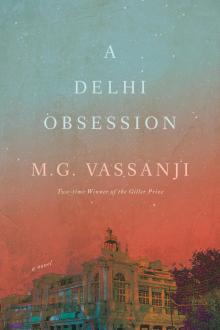 A Delhi Obsession
A Delhi Obsession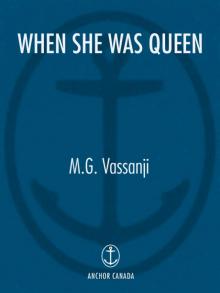 When She Was Queen
When She Was Queen No New Land
No New Land Nostalgia
Nostalgia Mordecai Richler
Mordecai Richler The Book of Secrets
The Book of Secrets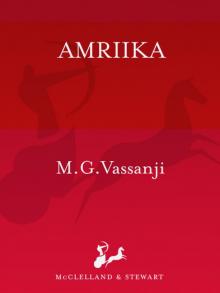 Amriika
Amriika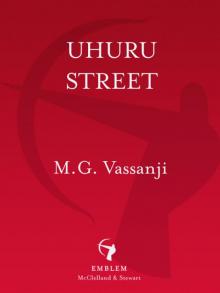 Uhuru Street
Uhuru Street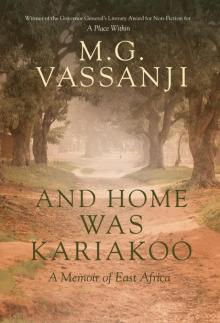 And Home Was Kariakoo
And Home Was Kariakoo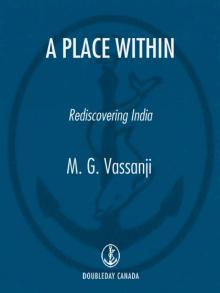 A Place Within
A Place Within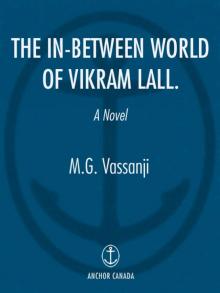 The In-Between World of Vikram Lall
The In-Between World of Vikram Lall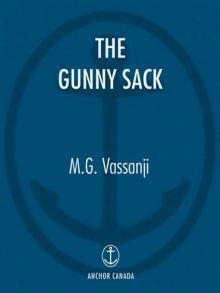 The Gunny Sack
The Gunny Sack